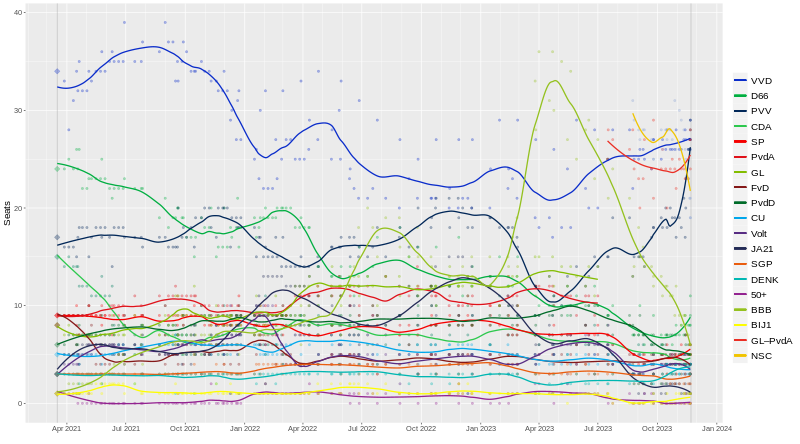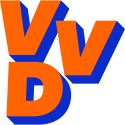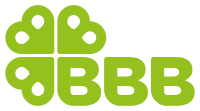A COMPREHENSIVE GUIDE TO THE 2023 DUTCH ELECTIONS
Everything you need to know about the main political parties, the dominant issues and recent opinion polling.
Graph 1: Opinion polling for the 2023 Dutch Elections
On the 22nd of November, 2023, 13M registered Dutch voters will head to polling booths across the country to cast a vote for their next government. It comes at a time of great volatility, as the main establishment parties founder in the polls while new political forces look set to dominate the political landscape for the foreseeable future.
Originally scheduled for 2025, four years after the last one had been held in March 2021, the elections were brought forward when the incumbent government resigned on 7 July 2023 after the four coalition partners (VVD + D66 + CDA + CU) failed to agree on a proposed limitation of family reunification for refugees fleeing armed conflict. Without a government or the parliamentary arithmetic for a new one, a snap election was triggered to break the political gridlock.
Mark Rutte, the incumbent prime minister who has led the Netherlands since 2010, will not be running, creating a large opening in the Dutch political space.
The contest is on a knife-edge, with four parties vying to win the most seats. In response to the threat of a right-wing government comprising of the PVV and BBB, left-wing voters have begun coalescing around Pvda-GL, while more moderate right-wing voters have flocked back to the VVD.
As the 5th largest economy and the country with the 7th largest population in the EU, the outcome of these elections offers major ramifications not only for the Netherlands but for the future of the EU.
Here is a list of the major political parties and the actors that will be playing a large role in the formation of Holland’s next government:
NSC (New Social Contract)
Leader = Pieter Omtzigt (Former CDA backbencher; famous for bringing attention to the 2021 childcare benefits scandal)
Political orientation = Centre, Big-Tent
Main ideology = Christian Democracy
Key manifesto pledges = Establish a constitutional court; cut immigration to 50,000 per year; lower tax burden for middle-class and small businesses; aim for at least 30%/homes per municipality to have social (rent) housing; build two new nuclear reactors; ban ads for unhealthy food; make payment of insurance deductibles flexible.
Potential Coalition Partners = VVD, PvdA-GL, PVV, BBB
Notes = As a big-tent, ostensibly centrist party, NSC will most likely be the kingmaker in the next round of government formations. It could either support a right-wing one with the VVD, PVV, and BBB, or may opt for a more moderate, grand coalition between the VVD and PvdA-GL. The outcome will likely depend on which coalition has the best arithmatics for a stable governing majority.
VVD (People’s Party for Freedom and Democracy)
Leader = Dilan Yesilgoz-Zegerius (former Justice Minister)
Political orientation = Centre-right
Main ideology = Conservative liberalism
Key manifesto pledges = Abolish permanent asylum permits; strike agreements with states in Africa/Middle East to prevent migrants from crossing the Mediterranean; extend time to obtain Dutch citizenship from 5 to 10 years; continue supporting Ukraine both financially and by providing them with weaponry; cut tax on energy bills and fuel; 55% CO2 reduction by 2030 and 100% reduction by 2050; climate fund (€35 billion) should be primarily used to fund the green energy transition of businesses & industry; lower tuition fees for studies for sectors with a labour shortage.
Potential coalition partners = NSC, G-PvdA, PVV
Notes = Having ruled the Netherlands for the last 13 years, VVD faces an uphill battle to defy convention and win a fifth consecutive term, an unseen feat in Dutch political history. Yesilgoz-Zegerius, the incumbent Justice Minister and VVD leader, has focused on migration in an effort to peel away voters from the PVV and BBB. She has also focused on her own struggles and background in order to improve her image with Dutch voters.
GroenLinks–PvdA
Leader = Frans Timmermans (European Commissioner for Climate Action)
Political orientation = Centre-left
Main ideology = Social Democracy, Progressiveism, Environmentalism
Key manifesto pledges = Cut CO2 emissions by 65% by 2030, achieve CO2-neutrality by 2040; introduce a monthly €50-ticket to use all forms of public transport outside rush hours; reverse privatisation of public transport, possibly a re-nationalisation; €16 minimum wage from age of 18; paid leave in case a direct family member dies; reintroduce top tax rate for highest incomes; Make child care a free public service; legalise the growing + selling of marijuana.
Potential coalition partners = NSC, VVD
Notes = Formed through a merger between the Labour and Green parties this year, PvdA-GL aims to be the standard bearer for left-wing Dutch voters. On the campaign trail, Timmermans has warned about the threat posed by a right-wing coalition dominated by PVV and has sought common ground with moderate leaders like Omtzigt in an effort to boost the chances of a grand coalition.
PVV (Party for Freedom)
Leader = Geert Wilders
Political orientation = Right-wing
Main ideology = National Conservatism, anti-EU, anti-immigration
Key manifesto pledges = Abolish the right to asylum; criminalise helping undocumented immigrants; ban mosques, the Quran and Islamic schools; lower pension age to 65; increase minimum wage; increase number of police officers by 10,000; double punishments for selling drugs to minors; halt the green energy transition of homes; withdraw from UN Paris Climate Agreement; abolish upper house of parliament; direct election of mayors; abolish international development aid.
Potential Coalition Partners = NSC, VVD, BBB
Notes = Despite predictions that his political career was over, Wilders keeps bouncing back. In 2019, the far-right FvD looked set to take his thunder, only to collapse a few years later due to scandals involving its leader. At one point in the summer last year, BBB also looked ready to usurp Wilders as leader of the right, only for its poll numbers to collapse amid internal divisions and unclear messaging. Wilders is looking to cement his place at the head of the Dutch right and win enough seats to force his way into a coalition involving the VVD and NSC, parties which have softened their stances towards him in recent years.
BBB (Farmer-Citizen Movement)
Leader = Caroline van der Plas
Political orientation = Centre-right
Main ideology = Agrarianism
Key manifesto pledges = 0% income tax for incomes till €30,000/year; protect Dutch products in future EU trade deals; 0% VAT on fruits and vegetables; abolish Nitrogen (pollution reduction) Law; raise highway speed limit to 130 km/h; create a new Ministry of Regional Affairs; elect parliament through regional PR; protect regional languages and dialects; Increase invest for more rural police stations.
Potential coalition partners = NSC, VVD, PVV
Notes = BBB has experienced the largest volatile in voting intentions out of all of the Dutch political parties in this race. Earlier this year, the agrarian, farmer’s interests party topped opinion polls after winning an upset victory in the Dutch Provincial elections, buoyed by a rural backlash against the government’s climate agenda. However, over the course of the election campaign, the BBB has seen its popularity fizzile out as more pressing matters dominate the national conversation. Now, the party is polling around 6-8 seats, a noticeable improvement of their results in 2021 where they gained 1 seat, but still a massive decline from the apex of their popularity where they were projected at around 25-28 seats.







